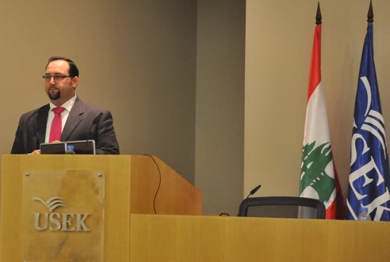
Setting it all! Photo (C) Ibrahim Chalhoub
0:00
0:00
The research project, Electronic Portfolio Learning, was carried over a period of a full semester in two remedial courses at MUT and USEK. It is an assessment project during which students composed written assignments in English, wrote diary entries, and participated in self-assessment and peer-assessment, said Dr. Halimi and added that two approaches, qualitative and quantitative, were applied to inspect the students’ experiences and perceptions.
In 2001, the “No Child Left Behind” act was amended in the United States of America in order to prevent students from failing their courses. Accordingly, alternative methods of evaluating the learning were adopted including portfolios through which students actively participate in the assessment of their own education. Dr. Halimi clarified to the Podcast Journal, during an exclusive interview, the presence of many variables that lead to a gap in the learning process between previous generations and the current one. Current students are multi-task oriented. You could easily see them working on their electronic devices performing a variety of actions in the same time. The recently announced doctor compares with the generation he, in his third decade, belongs to: We used to sit for sixty minutes attending a lecture from A to Z, but focused only on a single matter.
This is the first study of its kind in Lebanon and one of rare researches in the world, being electronically conducted. It consists of assigning two groups, one control and another experimental group, and students of the second cluster (41 out of 84) perform all necessary studies during the semester as if they were in a classical English university course. However, what is different is that students correct each others’ work in addition to their own assignments. The correction and grading are made according to a predetermined checklist defining a standardized method of review and assessment in the setting of which the students participate. Dr. Halimi, in his project, moved the study a step further by making the whole process Internet based which minimizes space utilization, provides ease of access to the data, and keeps the work environment friendly by reducing paper use. He focused on the fact that this work is one part of the technique and would have been incomplete without a reflective journal in which the students analyze their work from the beginning of the semester until its end showing the trend of their prospective improvement in the course. It is essential to note that the study was made in English courses for Lebanese students where this language is considered foreign.
Luckily, through this method English instructors will still perform their classical lectures while making their syllabi active rather than distributing them to students who usually lose them at the end of the first lecture. This recent application seems to be functional for English classes, according to Dr. Halimi. However, will it also be effective for other courses?
Slideshow from the conference below
In 2001, the “No Child Left Behind” act was amended in the United States of America in order to prevent students from failing their courses. Accordingly, alternative methods of evaluating the learning were adopted including portfolios through which students actively participate in the assessment of their own education. Dr. Halimi clarified to the Podcast Journal, during an exclusive interview, the presence of many variables that lead to a gap in the learning process between previous generations and the current one. Current students are multi-task oriented. You could easily see them working on their electronic devices performing a variety of actions in the same time. The recently announced doctor compares with the generation he, in his third decade, belongs to: We used to sit for sixty minutes attending a lecture from A to Z, but focused only on a single matter.
This is the first study of its kind in Lebanon and one of rare researches in the world, being electronically conducted. It consists of assigning two groups, one control and another experimental group, and students of the second cluster (41 out of 84) perform all necessary studies during the semester as if they were in a classical English university course. However, what is different is that students correct each others’ work in addition to their own assignments. The correction and grading are made according to a predetermined checklist defining a standardized method of review and assessment in the setting of which the students participate. Dr. Halimi, in his project, moved the study a step further by making the whole process Internet based which minimizes space utilization, provides ease of access to the data, and keeps the work environment friendly by reducing paper use. He focused on the fact that this work is one part of the technique and would have been incomplete without a reflective journal in which the students analyze their work from the beginning of the semester until its end showing the trend of their prospective improvement in the course. It is essential to note that the study was made in English courses for Lebanese students where this language is considered foreign.
Luckily, through this method English instructors will still perform their classical lectures while making their syllabi active rather than distributing them to students who usually lose them at the end of the first lecture. This recent application seems to be functional for English classes, according to Dr. Halimi. However, will it also be effective for other courses?
Slideshow from the conference below










 Industrie de demain : l’intelligence artificielle sous le feu des projecteurs
Industrie de demain : l’intelligence artificielle sous le feu des projecteurs








